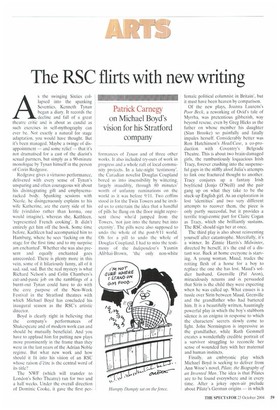The RSC flirts with new writing
Patrick Camegy on Michael Boyd's vision for his Stratford company
As the swinging Sixties collapsed into the spanking Seventies, Kenneth Tynan began a diary. It records the decline and fall of a great theatre critic and is about as candid as such exercises in self-mythography can ever be. Not exactly a natural for stage adaptation, you would have thought. But it's been managed. Maybe a twinge of disappointment — and some relief — that it's not dramatised for a cast of the diarist's sexual partners, but simply as a 90-minute monologue by Tynan himself in the person of Corin Redgrave.
Reclgrave gives a virtuoso performance, delivered with every sense of Tynan's unsparing and often courageous wit about his disintegrating gift and emphysemaracked body. Spanking sessions with Nicole, he disingenuously explains to his wife Katherine, are the curry side of his life (vindaloo rather than korma, one would imagine), whereas she. Kathleen, 'represented French cooking'. It didn't entirely get him off the hook. Some time before, Kathleen had accompanied him to Hamburg, where he sees 'fucking on the stage for the first time and to my surprise am enchanted'. Whether she was also present and equally enchanted goes unrecorded. There is plenty more in this vein, some of it hilariously funny, all of it sad, sad, sad. But the real mystery is what Richard Nelson's and Colin Chambers's cut-and-paste job on the ramblings of a burnt-out Tynan could have to do with the core purpose of the New-Work Festival in the Stratford theatres with which Michael Boyd has concluded his inaugural season as the RSC's artistic director.
Boyd is clearly right in believing that the company's performances of Shakespeare and of modern work can and should be mutually beneficial, And you have to applaud him for putting new plays more prominently in the frame than they were in the last years of the Adrian Noble regime, But what new work and how should it fit into his vision of an RSC whose raison d'être is the central word of its title?
The NWF (which will transfer to London's Soho Theatre) ran for two and a half weeks. Under the overall direction of Dominic Cooke, it gave the first per
formances of i'ynan and of three other works. It also included try-outs of work in progress and a whole raft of local community projects. In a late-night 'testimony', the Canadian novelist Douglas Coupland bored us into insensibility by wittering, largely inaudibly, through 80 minutes' worth of unfunny ruminations on the world as it was before 9/11. Two coffins stood in for the Twin Towers and he invited us to entertain the idea that a handful of pills he flung on the floor might represent those who'd jumped from the Towers, 'not just into the future but into eternity'. The pills were also supposed to undo the whole of the post-9/11 world. Oh for a pill to undo the whole of Douglas Coupland. I had to miss the testimony of the Independent's Yasmin Alibhai-Brown, 'the only non-white female political columnist in Britain', but it must have been heaven by comparison.
Of the new plays, Joanna Laurens's Poor Beck, a reworking of Ovid's tale of Myrrha, was pretentious gibberish, way beyond rescue, even by Greg Hicks as the father on whose member his daughter (Sian Brooke) so painfully and fatally impales herself. Considerably better was Ron Hutchinson's Head/Case, a co-production with Coventry's Belgrade Theatre. This is about two brain-damaged girls, the rumbustiously loquacious Irish Tracy, forever crashing into the suspenseful gaps in the stiffly aloof Julia's attempts to link one fractured thought to another. Tracy conjures up a fantasy Irish boyfriend (Jonjo O'Neill) and the pair gang up on what they take to be the stuck-up English girl. As an exploration in lost 'identities' and two very different attempts to recover them, the piece is only partly successful, but it provides a terrific tragi-comic part for Claire Cogan as Tracy, which she brilliantly sustains. The RSC should sign her at once.
The third play is also about reinventing yourself after catastrophe. Mercifully, it's a winner. In Zinnie Harris's Midwinter, directed by herself, it's the end of a distant war. Back at home everyone is starving. A young woman, Maud, trades the rotting flesh of a horse for a boy to replace the one she has lost. Maud's soldier husband, Grenville (Pal Aron), miraculously returns and is persuaded that Sirin is the child they were expecting when he was called up. What ensues is a tussle over Sirin between Maud, Grenville and the grandfather who had bartered him. Ills a beautifully written, hauntingly powerful play in which the boy's stubborn silence is an enigma in response to which the characters' secrets slowly come to light. John Normington is impressive as the grandfather, while Ruth Gemmell creates a wonderfully credible portrait of a survivor struggling to reconcile her sense of wounded fury with her maternal and human instincts.
Finally, an embryonic play which Michael Boyd is seeking to deliver from Ann Wroe's novel, Pilate, the Biography of an Invented Man. The idea is that Pilates are to be found everywhere andin every time. After a jokey open-air prelude about Pilate's German origins — in which
























































































 Previous page
Previous page